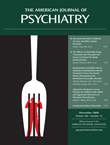The Efficacy of Self-Help Group Treatment and Therapist-Led Group Treatment for Binge Eating Disorder
Abstract
Objective: The purpose of this investigation was to compare three types of treatment for binge eating disorder to determine the relative efficacy of self-help group treatment compared to therapist-led and therapist-assisted group cognitive-behavioral therapy. Method: A total of 259 adults diagnosed with binge eating disorder were randomly assigned to 20 weeks of therapist-led, therapist-assisted, or self-help group treatment or a waiting list condition. Binge eating as measured by the Eating Disorder Examination was assessed at baseline, at end of treatment, and at 6 and 12 months, and outcome was assessed using logistic regression and analysis of covariance (intent-to-treat). Results: At end of treatment, the therapist-led (51.7%) and the therapist-assisted (33.3%) conditions had higher binge eating abstinence rates than the self-help (17.9%) and waiting list (10.1%) conditions. However, no between-group differences in abstinence rates were observed at either of the follow-up assessments. The therapist-led condition also showed more reductions in binge eating at end of treatment and follow-up assessments compared to the self-help condition, and treatment or waiting period completion rates were higher in the therapist-led (88.3%) and waiting list (81.2%) conditions than in the therapist-assisted (68.3%) and self-help (59.7%) conditions. Conclusions: Therapist-led group cognitive-behavioral treatment for binge eating disorder led to higher binge eating abstinence rates, greater reductions in binge eating frequency, and lower attrition compared to group self-help treatment. Although these findings indicate that therapist delivery of group treatment is associated with better short-term outcome and less attrition than self-help treatment, the lack of group differences at follow-up suggests that self-help group treatment may be a viable alternative to therapist-led interventions.



